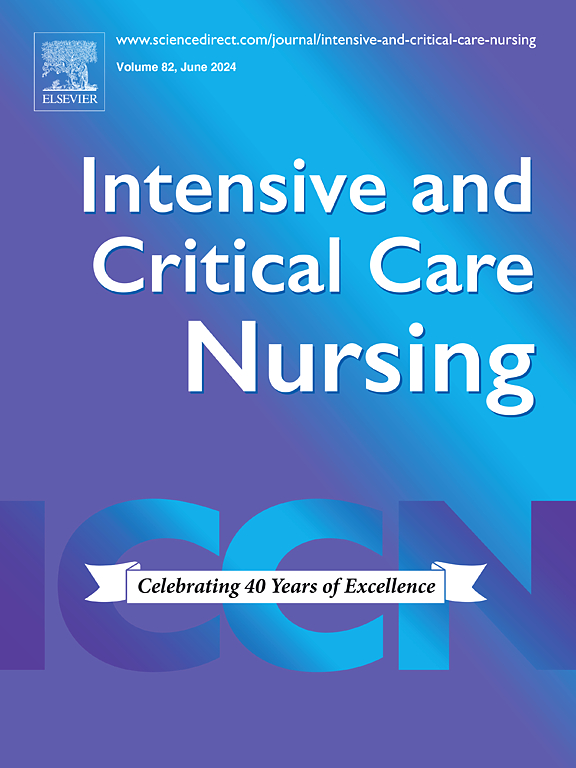利益相关者对减少ICU阿片类药物暴露的看法:一项改进的德尔菲调查
IF 4.7
2区 医学
Q1 NURSING
引用次数: 0
摘要
目的:全球阿片类药物流行凸显了重新评估疼痛管理策略和寻找替代方案以尽量减少阿片类药物暴露的必要性。阿片类药物是重症监护病房(icu)的主要镇痛药和镇静剂,但可能对患者和家属产生负面影响。本研究旨在通过一项涉及患者、家庭和医疗保健提供者的改进德尔菲研究,确定危重成人患者中与阿片类药物减少和镇痛辅助药物(如非甾体抗炎药[NSAIDs])使用相关的关键患者重要结果。方法采用改进的德尔菲法,包括在利益相关者(患者、家属和医疗保健提供者)中进行两轮调查和一轮讨论,以确定和评估患者重要的关键结果、评估时间点和适合随机对照试验的工具/定义。结果在两轮调查中,82%的参与者认为阿片类药物减少是一个关键的患者重要结果。从调查和利益相关者会议中出现了各种主题,显示了对ICU疼痛管理的药物和非药物辅助治疗的偏好。根据临床或非临床背景,观点各不相同。结论:参与者一致认为减少阿片类药物暴露和使用辅助疼痛管理策略是对患者至关重要的结果。需要进一步的研究来探索阿片类药物替代品以及药物和非药物干预的有效性和安全性。对临床实践的启示本研究强调,患者和家庭都重视减少阿片类药物暴露和探索替代方案,与医疗保健提供者的目标保持一致。改善阿片类药物使用的沟通和教育可以加强以患者为中心的护理。这些发现支持未来需要对辅助镇痛进行试验,以减少阿片类药物暴露并改善结果,从临床和患者家庭的角度考虑。本文章由计算机程序翻译,如有差异,请以英文原文为准。
Stakeholder perspectives on the reduction of opioid exposure in ICU: A modified Delphi survey
Purpose
The global opioid epidemic highlights the need to re-evaluate pain management strategies and find alternatives to minimize opioid exposure. Opioids are primary analgesics and sedatives in intensive care units (ICUs) but may have negative consequences for patients and families. This study aimed to identify key patient-important outcomes related to opioid reduction and the use of analgesic adjuncts (e.g., non-steroidal anti-inflammatory drugs [NSAIDs]) in critically ill adult patients through a modified Delphi study involving patients, families, and healthcare providers.
Methods
A modified Delphi process, including two survey rounds and one discussion round among stakeholders (patients, family members, and healthcare providers), was used to identify and rate key patient-important outcomes, evaluation time-points, and suitable tools/definitions for a potential randomized controlled trial.
Results
Opioid reduction was identified as a key patient-important outcome by 82% of participants across both survey rounds. Various themes emerged from surveys and stakeholder meetings, showing a preference for both pharmacological and non-pharmacological adjunctive therapies for ICU pain management. Opinions varied based on clinical or non-clinical backgrounds.
Conclusions
Participants agreed that reducing opioid exposure and using adjunctive pain management strategies are crucial patient-important outcomes. Further research is needed to explore the efficacy and safety of opioid alternatives and both pharmacologic and non-pharmacologic interventions.
Implications for Clinical Practice
This study highlights that both patients and families value reducing opioid exposure and exploring alternatives, aligning with healthcare providers’ goals. Improved communication and education about opioid use can enhance patient-centered care. These findings support the need for future trials on adjunctive analgesics to reduce opioid exposure and improve outcomes, addressing both clinical and patient-family perspectives.
求助全文
通过发布文献求助,成功后即可免费获取论文全文。
去求助
来源期刊

Intensive and Critical Care Nursing
NURSING-
CiteScore
6.30
自引率
15.10%
发文量
144
审稿时长
57 days
期刊介绍:
The aims of Intensive and Critical Care Nursing are to promote excellence of care of critically ill patients by specialist nurses and their professional colleagues; to provide an international and interdisciplinary forum for the publication, dissemination and exchange of research findings, experience and ideas; to develop and enhance the knowledge, skills, attitudes and creative thinking essential to good critical care nursing practice. The journal publishes reviews, updates and feature articles in addition to original papers and significant preliminary communications. Articles may deal with any part of practice including relevant clinical, research, educational, psychological and technological aspects.
 求助内容:
求助内容: 应助结果提醒方式:
应助结果提醒方式:


